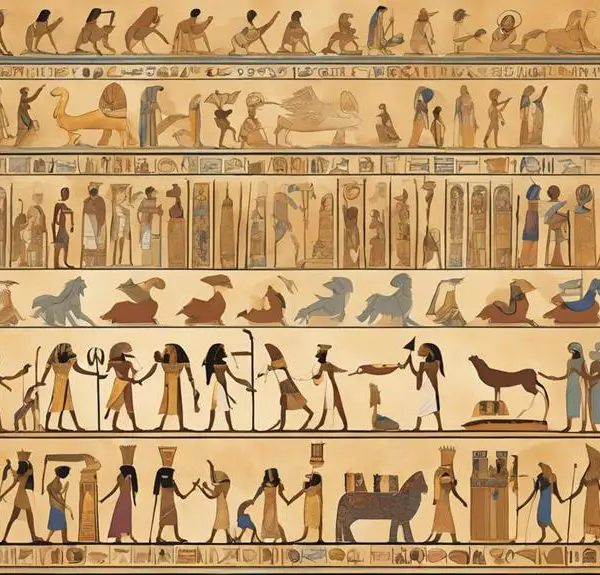Intriguing journey of a biblical dreamer escalates from familial betrayal to becoming a Pharaoh's confidant—discover the power of dreams and faith.

A Dreamer in the Bible
In a tale as old as time itself, you'd find no story more captivating than that of Joseph, the ultimate dreamer in the Bible. His journey from being his father's favorite to a slave in Egypt, then prison, and finally to the Pharaoh's right-hand man, seems almost too extraordinary to be real.
Yet, it's his unyielding faith and his unique ability to interpret dreams that set him apart. You're left wondering, how did a young boy's dreams of stars and sheaves bowing to him lead to such a dramatic rise to power and influence in a foreign land?
The answer lies in exploring the twists and turns of Joseph's life, where each decision and dream interpreted weaves the fabric of his legacy of faith.
Key Takeaways
- Joseph's ability to interpret dreams elevates him from slavery to power in Egypt.
- His dreams and interpretations exhibit divine guidance and insight into the future.
- Despite betrayal and adversity, Joseph's faith and resilience lead to his rise and reconciliation.
- Joseph's story underscores the importance of forgiveness, leadership, and divine inspiration in overcoming challenges.
Early Life and Dreams

In analyzing the early life and dreams of Joseph, a central figure in biblical narratives, it's evident that his youthful experiences and visionary dreams not only shaped his personal trajectory but also had profound implications for his family dynamics and future national events. Growing up in a Canaanite culture, Joseph's upbringing was steeped in the complexities of ancient societal norms and familial expectations. His father, Jacob, showed him favoritism, a decision that further strained his relationships with his brothers and underscored the competitive and sometimes hostile nature of family dynamics within his context.
Joseph's dreams, vivid and symbolic, foretold his ascendance over his family, exacerbating tensions and jealousy among his siblings. These dreams, while personal to Joseph, weren't isolated experiences but rather reflections of the broader Canaanite cultural emphasis on divination and prophecy. They highlighted the importance of dreams as a means of divine communication, influencing not only Joseph's understanding of his own destiny but also his family's perception of him. This early period of Joseph's life, marked by dream-induced familial strife and cultural adherence to prophetic visions, set the stage for his eventual journey into Egypt, shaping his character and future leadership.
Betrayal and Slavery
Following his brothers' betrayal, Joseph's descent into slavery marked a pivotal transition, underscoring the fragility of familial bonds and the harsh realities of ancient Near Eastern societies. This act of treachery not only illuminates the complexities within family dynamics but also serves as a testament to Joseph's psychological resilience. Despite the profound betrayal by his own kin, he doesn't succumb to despair or bitterness. Instead, his journey into slavery becomes a crucible for his character, refining his resilience and adaptability.
The dynamics within Joseph's family—envy, deception, and rivalry—mirror the broader societal norms where power and survival often dictated relationships, even among relatives. His brothers' actions reflect a culmination of jealousy and fear, driven by Joseph's favored status and his prophetic dreams. Yet, it's Joseph's response to these trials that highlights his remarkable psychological fortitude. Rather than allowing his spirit to be crushed by malice and misfortune, he navigates his enslavement with an unwavering strength of character.
Joseph's story, thus, offers profound insights into the interplay between family dynamics and individual resilience. His ability to withstand and grow through such adversity underscores the potential for personal development, even in the face of familial betrayal and the hardships of slavery.
The Gift of Interpretation

Joseph's remarkable ability to interpret dreams often served as a beacon of hope amid his tumultuous journey, highlighting a unique spiritual gift that set him apart in the ancient world. This skill wasn't just a personal asset; it was a conduit for divine communication, deeply intertwined with the cultural perceptions of his time.
Here's why Joseph's gift was so significant:
- Divine Endorsement: Joseph's interpretations were seen as messages from God, showcasing his direct connection to divine wisdom. This wasn't mere intuition; it was a profound understanding of the divine will.
- Cultural Resonance: In the ancient world, dreams were considered significant omens. Joseph's ability to decipher these cryptic messages placed him in a unique position of authority and respect.
- Psychological Insight: His interpretations often revealed deep psychological insights into the dreamers' minds and situations, further proving his exceptional gift.
- Navigational Tool: For Joseph and those around him, dream interpretation served as a navigational tool, guiding decisions and actions according to perceived divine direction.
Analyzing Joseph's gift of interpretation not only sheds light on his personal journey but also offers a lens through which to view ancient cultural perceptions of dreams as channels of divine communication.
Rise to Power
Leveraging his unique gift for dream interpretation, Joseph ascended to a position of significant power within Egypt, a journey that not only transformed his personal destiny but also had profound implications for his people. Your understanding of this ascent is critical to grasping the dynamics of political maneuvering and the formation of unexpected alliances in ancient times. Joseph's ability to interpret the Pharaoh's dreams accurately was the cornerstone of his rise. This not only saved Egypt from a devastating famine but also positioned him as a key advisor to the Pharaoh.
Aspect |
Impact |
Mechanism |
|---|---|---|
Dream Interpretation |
Immediate Recognition |
Insight into Egypt's future |
Political Maneuvering |
Ascension to Power |
Strategic resource management |
Unexpected Alliances |
Preservation of His People |
Leveraging position for familial reconciliation |
Your analysis of Joseph's journey reveals a landscape where skill and opportunity converge, leading to unprecedented outcomes. Joseph's story isn't just one of personal achievement; it's a narrative filled with lessons on navigating the complex web of political dynamics and alliances. Through this lens, you see how Joseph's dream-led strategy laid the groundwork for his rise, showcasing his adeptness at turning personal adversity into a tool for broader salvation.
Legacy of Faith

Examining the enduring legacy of faith Joseph left behind, it becomes clear how his spiritual resilience and unwavering belief in the divine shaped not only his personal journey but also had a lasting impact on the cultural and religious landscape of his descendants. Joseph's story is a testament to the power of faithful resilience and divine guidance, illuminating the path for generations that followed.
Here are key aspects of Joseph's legacy of faith:
- Foundation of Faithful Resilience: Joseph's unwavering trust in God during times of adversity set a precedent for enduring faithfulness amidst trials.
- Blueprint for Divine Guidance: His ability to interpret dreams and recognize divine will provided a model for seeking and interpreting divine guidance.
- Example of Forgiveness and Reconciliation: Joseph's reconciliation with his brothers demonstrated the strength of forgiveness and its role in healing and restoration.
- Inspiration for Leadership and Governance: His ascent to power and wise management of Egypt's resources during famine years offer insights into leadership grounded in faith and integrity.
Joseph's legacy is a beacon of faithful resilience and divine guidance, offering enduring lessons on the interplay between faith, leadership, and reconciliation.
Frequently Asked Questions
How Did the Cultural and Historical Context of the Time Influence the Dreamer's Understanding and Interpretation of Dreams?
In ancient times, cultural and historical contexts greatly influenced your understanding and interpretation of dreams. With ancient cosmology and dream divination at the core, you'd interpret dreams not just as personal experiences but as divine messages or omens.
This perspective was shaped by the era's beliefs and knowledge, where dreams were seen as a connection to the divine or supernatural realm, guiding your actions and decisions based on these celestial communications.
What Psychological Theories Could Be Applied to Analyze the Dreamer's Ability to Remember and Interpret Dreams so Accurately?
You're navigating the labyrinth of the mind, where dreams weave intricate tales.
To dissect the dreamer's sharp memory and interpretation skills, let's apply psychological theories.
The neurological basis of dreaming lights the path, revealing how brain patterns shape dream recall.
Dream symbolism, a language of the subconscious, provides keys to unlock hidden meanings.
This analytical journey uncovers how the interplay between the brain's wiring and symbolic understanding molds one's adeptness at navigating the dream world.
Are There Any Archaeological Findings or Historical Records Outside of the Biblical Narrative That Corroborate the Dreamer's Story or Existence?
You're delving into whether archaeological findings or historical records support the existence or stories of a noteworthy dreamer. Despite extensive research, evidence directly corroborating the dreamer's lineage or specific anecdotes is scarce. Scholars note geographical inconsistencies in the accounts, raising questions about historical accuracy.
However, the absence of concrete evidence doesn't invalidate the cultural or spiritual significance of these narratives, which continue to inspire and intrigue.
How Has the Dreamer's Story Influenced Modern Dream Interpretation Practices or Psychology?
Exploring how dream interpretation has evolved, you'll find that 90% of your dreams are forgotten within 10 minutes of waking up. Yet, the study of dream symbolism and interpretation techniques remains deeply influenced by historical figures' insights.
Analyzing these practices, it's evident that their roots trace back to ancient wisdom, offering a rich tapestry of methods for understanding our subconscious.
This analytical journey reveals the profound impact of historical narratives on modern psychology and dream interpretation practices.
In What Ways Has the Dreamer's Story Been Adapted or Referenced in Contemporary Literature, Art, or Popular Culture, Beyond Religious Texts?
You've likely noticed how today's artists and writers draw from historical narratives to inspire their work.
In contemporary culture, the story of the Dreamer has sparked numerous musical adaptations, weaving ancient themes into modern melodies and lyrics.
Fashion inspirations have also emerged, with designers incorporating symbolic elements into their collections.
This melding of old and new showcases a creative dialogue between the past and present, demonstrating the timeless relevance of the Dreamer's journey.
Conclusion
In analyzing the narrative of Joseph, it's clear that his journey symbolizes the transformative power of resilience and faith.
You've witnessed how dreams, initially the source of his betrayal, became the very tool for his ascent. Joseph's story isn't just a testament to personal fortitude; it's a broader allegory for the belief that, even in the depths of despair, one's gifts can pave the way to redemption and influence.
His legacy, therefore, isn't merely historical; it's a perpetual beacon of hope and perseverance.



Sign up